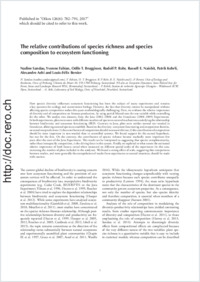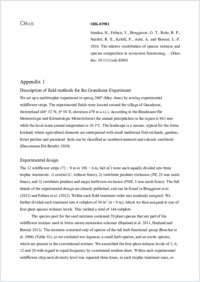The relative contributions of species richness and species composition to ecosystem functioning
- Sandau, Nadine Unit of Ecology and Evolution, Univ. of Fribourg, Switzerland - Ecosystem Dynamics, Swiss Federal Inst. for Forest, Snow and Landscape Research WSL, Birmensdorf, Switzerland
- Fabian, Yvonne Unit of Ecology and Evolution, Univ. of Fribourg, Switzerland
- Bruggisser, Odile T. Unit of Ecology and Evolution, Univ. of Fribourg, Switzerland
- Rohr, Rudolf P. Unit of Ecology and Evolution, Univ. of Fribourg, Switzerland
- Naisbit, Russell E. Unit of Ecology and Evolution, Univ. of Fribourg, Switzerland
- Kehrli, Patrik Station de recherche Agroscope Changins – Wädenswil ACW, Nyon, Switzerland
- Aebi, Alexandre Laboratory of Soil Biology, Univ. of Neuchâtel, Switzerland
- Bersier, Louis-Félix Unit of Ecology and Evolution, Univ. of Fribourg, Switzerland
-
01.06.2017
Published in:
- Oikos. - 2017, vol. 126, no. 6, p. 782–791
English
How species diversity influences ecosystem functioning has been the subject of many experiments and remains a key question for ecology and conservation biology. However, the fact that diversity cannot be manipulated without affecting species composition makes this quest methodologically challenging. Here, we evaluate the relative importance of diversity and of composition on biomass production, by using partial Mantel tests for one variable while controlling for the other. We analyse two datasets, from the Jena (2002–2008) and the Grandcour (2008–2009) Experiments. In both experiments, plots were sown with different numbers of species to unravel mechanisms underlying the relationship between biodiversity and ecosystem functioning (BEF). Contrary to Jena, plots were neither mowed nor weeded in Grandcour, allowing external species to establish. Based on the diversity–ecosystem functioning and competition theories, we tested two predictions: 1) the contribution of composition should increase with time; 2) the contribution of composition should be more important in non-weeded than in controlled systems. We found support for the second hypothesis, but not for the first. On the contrary, the contribution of species richness became markedly more important few years after the start of the Jena Experiment. This result can be interpreted as suggesting that species complementarity, rather than intraspecific competition, is the driving force in this system. Finally, we explored to what extent the estimated relative importance of both factors varied when measured on different spatial scales of the experiment (in this case, increasing the number of plots included in the analyses). We found a strong effect of scale, suggesting that comparisons between studies, and more generally the extrapolation of results from experiments to natural situations, should be made with caution.
- Faculty
- Faculté des sciences et de médecine
- Department
- Département de Biologie
- Language
-
- English
- Classification
- Biological sciences
- License
- License undefined
- Identifiers
-
- RERO DOC 305028
- DOI 10.1111/oik.03901
- Persistent URL
- https://folia.unifr.ch/unifr/documents/305901
Other files
Statistics
Document views: 121
File downloads:
- ber_rcs.pdf: 158
- ber_rcs_sm.pdf: 116

